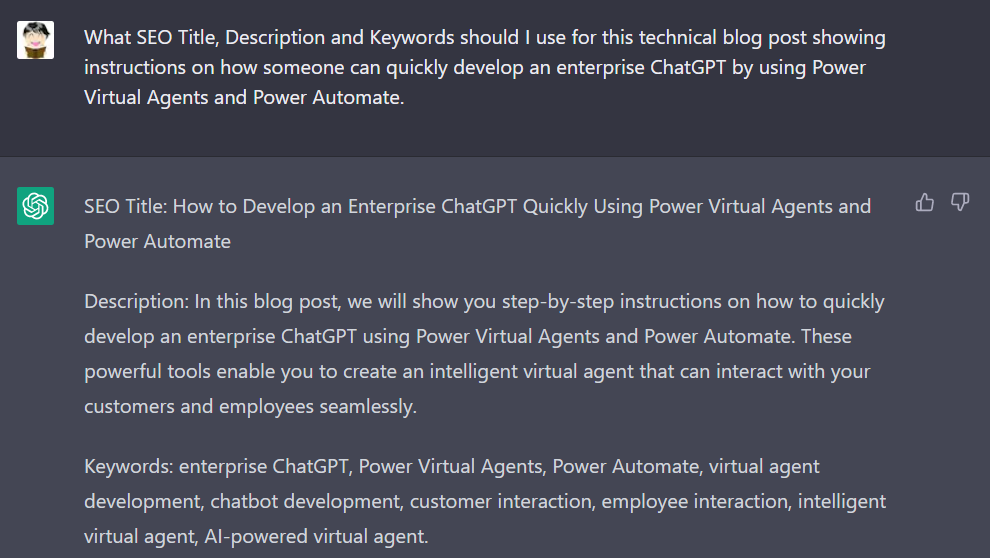How to Use ChatGPT to Optimize Your Website for SEO
Majority of this article is generated using ChatGPT :)
The content of this article is updated on 27 March 2023 as some information was wrong. Which I explain below.
What is SEO?
Search Engine Optimization (SEO) is a critical component of any website’s success. Without proper SEO, your website might not show up in search results, which can lead to low traffic, poor engagement, and lost revenue. Fortunately, there are many tools available to help you optimize your website for SEO, including ChatGPT - a powerful language model that can provide insights and guidance on how to improve your website’s SEO.
Using ChatGPT for SEO
Here’s how you can use ChatGPT to optimize your website for SEO:
- Identify Relevant Keywords: The first step in optimizing your website for SEO is to identify the keywords that are relevant to your business and your target audience. ChatGPT can help you identify these keywords by analyzing your website’s content and providing insights on what keywords your target audience might be using in their search queries.
- Analyze Your Website’s Structure: The structure of your website can have a significant impact on its SEO performance. ChatGPT can analyze your website’s structure and provide insights on how to improve its navigation, URL structure, and internal linking to optimize for search engines.
- Optimize Your Content: High-quality, engaging content is critical for SEO success. ChatGPT can help you optimize your website’s content by analyzing your pages and providing insights on how to improve the readability, structure, and relevance of your content for search engines.
- Improve Your Website’s Speed: Website speed is a crucial factor in SEO, as slow loading times can negatively impact user experience and search engine rankings. ChatGPT can provide insights on how to improve your website’s speed, such as optimizing images, minimizing code, and using caching techniques.
- Track Your Progress: SEO is an ongoing process, and it’s important to track your progress to see how your efforts are impacting your website’s performance. ChatGPT can provide insights on how to track your website’s SEO performance, such as using Google Analytics to monitor traffic and engagement.
In conclusion, ChatGPT can be a valuable tool for optimizing your website for SEO. By using its powerful language processing capabilities, you can gain insights and guidance on how to improve your website’s structure, content, speed, and overall SEO performance. With the right strategy and tools, you can achieve higher search engine rankings, more organic traffic, and greater business success.
Practical Application
Here’s how I used ChatGPT to optimize my last post for SEO:
1
2
3
4
5
6
7
8
9
10
11
12
13
14
15
16
17
---
title: 'Using OpenAI and Power Virtual Agents for Conversational AI'
description: In this blog post, we will show you step-by-step instructions on how to quickly develop an enterprise ChatGPT using Power Virtual Agents and Power Automate, and integrate into Microsoft Teams.
keywords: OpenAI, Enterprise ChatGPT, Power Virtual Agents, Power Automate, virtual agent development, chatbot development, intelligent virtual agent, AI-powered virtual agent, Microsoft Teams integration.
image: /assets/img/posts/20230224-PVA-Output.png
date: '2023-02-24T23:59:00+08:00'
layout: post
permalink: /raztype/openai-powervirtualagent/
categories:
- RazType
tags:
- 'openai'
- 'power virtual agent'
- 'chatbot'
---
CONTENT HERE
Learning (March Update)
ChatGPT is a pre-trained model that cannot not look into the contents of a URL. It also by default answers in an authoritative way even when it’s wrong or simply guessing. In the example below, ChatGPT is giving recommendations by inferring on the URL text itself raffertyuy...openai...powervirtualagent. 
If it wasn’t clear, don’t do this. Instead, ask for recommendations by giving ChatGPT some context of what the post is about (see example above.)
